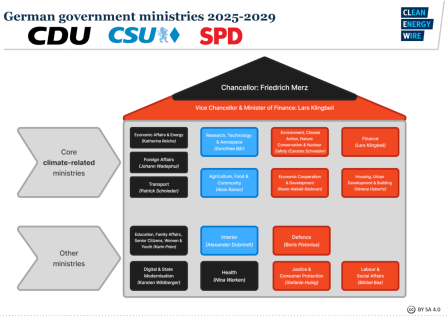
21 July 2025
The formation of Germany’s government under Chancellor Friedrich Merz from the CDU/CSU (Christian Democratic Union / Christian Social Union) in a “grand coalition” with the SPD (Social Democrats) has signalled continuity on climate targets whilst introducing notable shifts in how environmental policy is managed and funded across the government.
A Restructuring of Germany’s Climate Policy
The ministerial structure of the new government signifies a broad reorganisation. In the preceding "traffic light coalition", climate considerations were prominently featured across several ministries, with the "Ministry for Economics and Climate Protection" (BMWK) adopting an integrated approach by incorporating "Climate" alongside "Economics", even in its title. In addition, the Foreign Ministry assumed responsibility for climate diplomacy. Specifically, Jennifer Morgan served as Germany's climate diplomat in Foreign Affairs, contributing to the German delegation's efforts at UN climate change conferences (COPs). In contrast, the new coalition consolidated climate expertise and national and international climate policy responsibilities, primarily within the Environment Ministry, which is now led by Carsten Schneider (SPD). Schneider's background is in finance-focused governance expertise, and as former East Commissioner, he has experience in navigating political divides.
The appointed Foreign Minister, Johann Wadephul, has already sought to allay concerns regarding his commitment to climate diplomacy, a commitment which he has previously identified as a cross-cutting issue.,aAs he stated to the newspaper FAZ: “If the foreign office focuses more strongly on its core competences in foreign and security policy under my leadership in the future, this will naturally also include foreign climate policy. Because climate policy is security policy.”

Historic Infrastructure Investment and Budget Transformation
Chancellor Merz secured agreement with the Greens on a massive spending package that represents a fundamental shift in Germany's fiscal approach, as it required amending Germany’s constitutional debt brake. The agreement unlocks up to €1 trillion for defence and infrastructure over the next decade, with €500 billion specifically earmarked for infrastructure and climate investments over 12 years. €100 billion will flow directly to the Climate and Transformation Fund for the state governments and municipalities, which can be used for local infrastructure, district heating networks, and clean energy projects, and an additional €16 billion euros becomes available to federal governments.
Early Policy Priorities and Implementation Approaches
The appointment of Katharina Reiche as Minister for the renamed “Ministry for Economy and Energy” (BMWE) brings industry expertise in the energy sector to the role. Reiche, who served as CEO of energy company E.ON’s subsidiary Westenergie AG until 2025, has acknowledged her predecessor Robert Habeck’s “extraordinary work”. Her key focuses for this legislature through bring in a shift to Habeck’s focus, while the new government has reaffirmed its commitment to the Paris Agreement and the target to reach climate neutrality by 2045.
The government's stated policy framework emphasises the importance of ensuring energy security whilst pursuing climate goals through what officials describe as flexible pathways to climate neutrality. According to the coalition agreement, the energy strategy encompasses plans for up to 20 gigawatts of new gas-fired back-up power plants, which the government positions as viewing gas as an important "bridge technology" for energy security. The government has also moved forward with expanding domestic energy production capabilities, including the cabinet approval of the agreement with the Netherlands for gas extraction off Borkum, which officials project to yield up to 13 billion cubic meters of natural gas from the North Sea site.
The coalition's approach calls for transitioning renewable energy installations towards market-based financing, with the government planning a re-assessment of future electricity demand by summer 2025 to evaluate expansion needs. Germany continues the plan of ramping up its hydrogen strategy using "all colours" in the transition, with hydrogen flowing in pipelines from 2025 and a "core hydrogen network" completion targeted for 2032. Officials highlight this as crucial for decarbonising steel, chemicals, and aviation sectors. Also, the coalition has committed to introducing legislation "immediately after the beginning of the legislative period" enabling carbon capture, transport, utilisation and storage (CCS/CCU) for industrial processes where emissions are difficult to avoid, as well as for gas-fired power plants, with the government proposing CO2 storage both offshore and onshore where suitable.
Looking Ahead
The government faces growing pressure to ensure that it’s climate policies don't leave anyone behind. The installation of heat pumps, the purchase of electric vehicles, and the management of higher fuel costs resulting from CO2-pricing affects all citizens, but especially low-income households require additional support. The former government's failure to implement a "climate bonus" scheme, which was intended to redistribute carbon pricing revenues to low-income citizens, underscores these challenges. Despite the new government’s pledges of support for low-income households, specific mechanisms remained unclear and the most recent decision to exclude households from promised electricity tax cuts, granted only to companies, has drawn considerable public criticism. The challenge to realize a just transition will intensify when the EU emissions trading system for transport and buildings begins in 2027, making financially tiered support mechanisms increasingly essential.
Germany’s clean economy transition is already well underway, with the electricity sector now generating nearly two-thirds of its power from renewable sources. However, the new coalition must accelerate electrification for cars and buildings, which still predominantly rely on fossil fuels, and diversify the fuel mix by reducing carbon-intensive fossil fuel consumption. This will require a clear, courageous plan backed by public investment to make Germany’s economy truly “fit for purpose.”
Investments in storage solutions, grid infrastructure, and green hydrogen are essential to address challenges such as the “Dunkelflaute” as periods of low renewable generation. In this context, the transport of hydrogen from Canada, under the German-Canadian Hydrogen Alliance, should be further developed. Strengthening this partnership, along with increased political support, investment, and transatlantic cooperation, can help drive the global clean energy transition and reinforce Germany’s leadership in the move towards a sustainable future.
